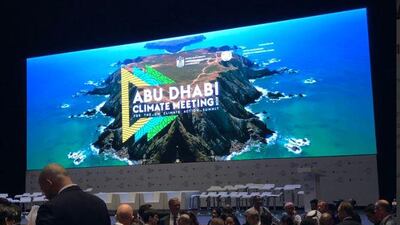The United Nations Secretary General, together with the Government of the United Arab Emirates, is hosting an important climate meeting that begins in Abu Dhabi on Sunday. This gathering of government ministers – together with leaders from the business, indigenous and civil society communities – has attracted little fanfare outside of the climate policy world – as it is seen merely as a preparatory meeting for the Secretary-General’s Climate Summit happening later in the year. But make no mistake, this meeting marks a critical milestone in the global struggle against climate change.
We can expect Secretary General António Guterres to deliver a set of challenging marching orders to the participants at the Emirates Palace in the search for solutions of a scale commensurate with the challenge of climate change.
The situation is urgent. In many major economies, emissions continue to grow and time is running out for us to take the action needed to keep the rise in global temperature below 2 degrees – the goal set by the Paris Agreement.
Unfortunately, the current commitments that countries have made to reduce emissions will not achieve this goal and, in fact, are leading us to a world that will be at least 3 degrees warmer by the end of the century. On top of this, the finance that’s needed to help developing countries reduce their emissions and adapt to the effects of climate change has not yet come close to the US$100 billion a year promised by the developed world.
The Secretary-General’s summit offers a unique opportunity to chart a new course. It will break from the UN mold by only giving stage time to those who come with concrete plans for climate action. As the Secretary-General keeps saying, “bring plans, not speeches.”
His vision is that countries and coalitions will come forward with initiatives and commitments that send clear political and market signals, that are measurable and scalable, and that support broader sustainable development. To facilitate this, he has split the preparations into nine work streams – which cover topics like finance, resilience and energy transition – led by groups of countries that have been asked to come up with concrete proposals.
The purpose of the Abu Dhabi meeting is to review these proposals, identify synergies, and begin to determine what meets the criteria for presentation at the summit.
This is a tall order. Coming to terms with the huge diversity of proposals and corralling them into a package that both meets the Secretary-General’s strict criteria, and which also creates a compelling narrative that speaks to the general public, is an immense task. Failure will lead to a significant loss in confidence that leaders are able to muster the political will needed to avert the looming climate crisis.
And so, you can see this is much more than just a preparatory meeting. Over the course of the next two days, we will get an indication of whether or not the summit will be able to deliver meaningful outcomes at the scale needed to make a real difference. While there are a broad range of opportunities on the table, there is one area that is seeing an exciting amount of momentum, but which may not be a familiar concept outside of climate circles: nature-based solutions to climate change.
Broadly speaking, these encompass both the ways we can manage natural landscapes to reduce carbon emissions, as well as the ways we can increase the power of nature to remove carbon from the atmosphere. Preventing deforestation and promoting reforestation, improving forestry practices, and finding more efficient ways to use land for agriculture are all examples.
Natural climate solutions have the potential to deliver up to a third of the mitigation needed by 2030, but they are currently receiving only a small fraction of global climate finance.
However, we’re seeing a growing diplomatic effort to boost support for natural climate solutions in the lead up to the Secretary-General’s climate summit, led by China and New Zealand.
This marks an exciting development and represents one of the best opportunities for the summit to deliver a transformational impact.
More and more countries are coming to understand that support for nature is an integral part of the global response to climate change – alongside rapid decarbonisation of the industrial economy – and an alliance is forming to carry this message into the upcoming meeting in Abu Dhabi and beyond.
Not only are natural climate solutions one of the most effective ways that countries can enhance the ambition of their emission-reduction targets, there is also a wealth of untapped potential to use the flexibility allowed by the Paris Agreement to form partnerships to promote natural climate solutions. In this way, even countries without significant forest cover, like the UAE, can play a role.
The Abu Dhabi meeting represents an important opportunity to capitalise on this momentum and harness it into a powerful outcome for the summit. We no longer have the luxury of being able to pick and choose solutions to the climate crisis. We need to muster every response available to us and make sure we don’t leave anything on the table. I commend the leadership of the UAE Government for hosting this meeting and hope that we emerge with positive signals that the world is up to the challenge.
Peter Graham is a managing director of the Washington DC think tank Climate Advisers and prior to that led WWF’s Global Climate Programme. He is attending the Abu Dhabi Climate Meeting in support of Nature4Climate and the Global Platform for the New York Declaration on Forests to help coordinate preparations for the UN Secretary-General's Climate Summit on 23 September.


